人教版高中英语必修一
- 格式:docx
- 大小:64.18 KB
- 文档页数:20
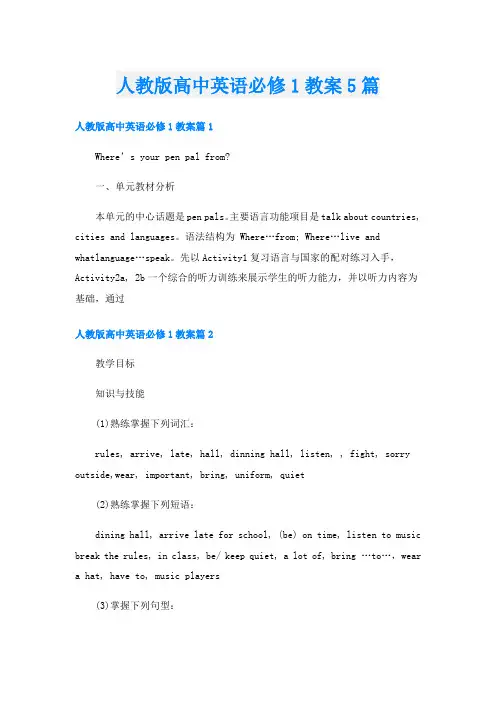
人教版高中英语必修1教案5篇人教版高中英语必修1教案篇1Where’s your pen pal from?一、单元教材分析本单元的中心话题是pen pals。
主要语言功能项目是talk about countries, cities and languages。
语法结构为 Where…from; Where…live and whatlanguage…speak。
先以Activity1复习语言与国家的配对练习入手,Activity2a, 2b一个综合的听力训练来展示学生的听力能力,并以听力内容为基础,通过人教版高中英语必修1教案篇2教学目标知识与技能(1)熟练掌握下列词汇:rules, arrive, late, hall, dinning hall, listen, , fight, sorry outside,wear, important, bring, uniform, quiet(2)熟练掌握下列短语:dining hall, arrive late for school, (be) on time, listen to music break the rules, in class, be/ keep quiet, a lot of, bring …to…,weara hat, have to, music players(3)掌握下列句型:1. Dont eat in class.2. You must be on time.3. Eat in the dining hall.4. 正确使用情态动词can, can’t——Can we wear a hat in school?——Yes, we can./No, we can’t.5. 能正确使用have to 和 must 谈论规章制度We must be on time/ We also have to be quiet in the library. 教学重难点重点:1) 肯定祈使句是省略掉主语的原形动词开头;2) 否定祈使句则是在肯定祈使句前加上“don’t”。
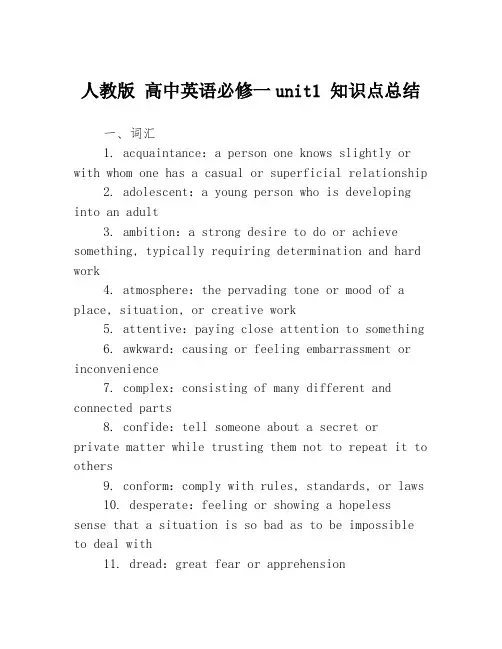
人教版高中英语必修一unit1 知识点总结一、词汇1. acquaintance:a person one knows slightly or with whom one has a casual or superficial relationship2. adolescent:a young person who is developing into an adult3. ambition:a strong desire to do or achieve something, typically requiring determination and hard work4. atmosphere:the pervading tone or mood of a place, situation, or creative work5. attentive:paying close attention to something6. awkward:causing or feeling embarrassment or inconvenience7. complex:consisting of many different and connected parts8. confide:tell someone about a secret orprivate matter while trusting them not to repeat it to others9. conform:comply with rules, standards, or laws10. desperate:feeling or showing a hopeless sense that a situation is so bad as to be impossible to deal with11. dread:great fear or apprehension12. embarrass:cause (someone) to feel awkward, self-conscious, or ashamed13. encounter:meet (someone) unexpectedly or by chance14. forbid:refuse to allow (something)15. gesture:a movement of part of the body, especially a hand or the head, to express an idea or meaning16. hesitant:uncertain or unwilling to take action17. identical:similar in every detail; exactly alike18. indifferent:having no particular interest or sympathy; unconcerned19. obliging:willing to do a service or kindness; helpful20. passionate:showing or caused by strong feelings or a strong belief二、句型1. It's quite an experience to have someone who knows you better than you know yourself.2. Who […] dares to live life to the full?3. Of course, being well off helps, but money alone can't bring happiness.4. I'm not going to pretend that I find it easyto talk to people I don't know.5. I can't stand people who pretend to besomething they're not.6. I was so embarrassed that I wanted to crawl into a hole and disappear.7. He was so good-looking that he made everyone else in the room seem plain and ordinary.8. He's the sort of person who will do anything for a laugh.9. I had a feeling that she wasn't telling me the whole truth.10. It's funny how you can live somewhere for years and still not know your neighbours.三、语法1. 主语 + be + adj.:作主语补语,表示主语的状态或特征。
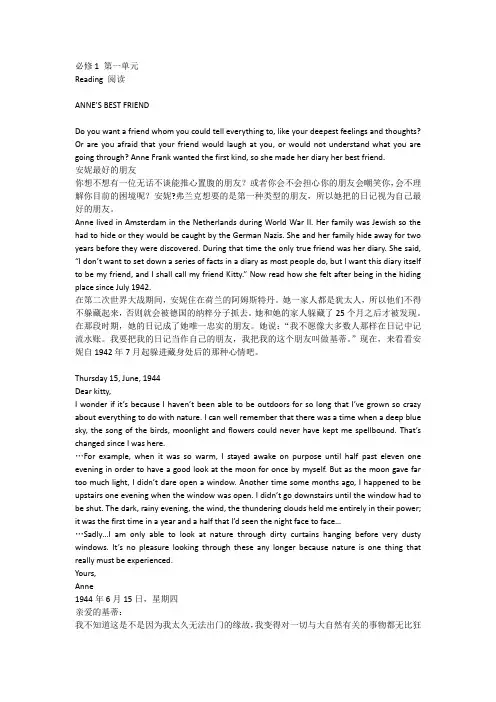
必修1 第一单元Reading 阅读ANNE’S BEST FRIENDDo you want a friend whom you could tell everything to, like your deepest feelings and thoughts? Or are you afraid that your friend would laugh at you, or would not understand what you are going through? Anne Frank wanted the first kind, so she made her diary her best friend.安妮最好的朋友你想不想有一位无话不谈能推心置腹的朋友?或者你会不会担心你的朋友会嘲笑你,会不理解你目前的困境呢?安妮?弗兰克想要的是第一种类型的朋友,所以她把的日记视为自己最好的朋友。
Anne lived in Amsterdam in the Netherlands during World War II. Her family was Jewish so the had to hide or they would be caught by the German Nazis. She and her family hide away for two years before they were discovered. During that time the only true friend was her diary. She said, “I don’t want to set down a series of facts in a diary as most pe ople do, but I want this diary itself to be my friend, and I shall call my friend Kitty.” Now read how she felt after being in the hiding place since July 1942.在第二次世界大战期间,安妮住在荷兰的阿姆斯特丹。
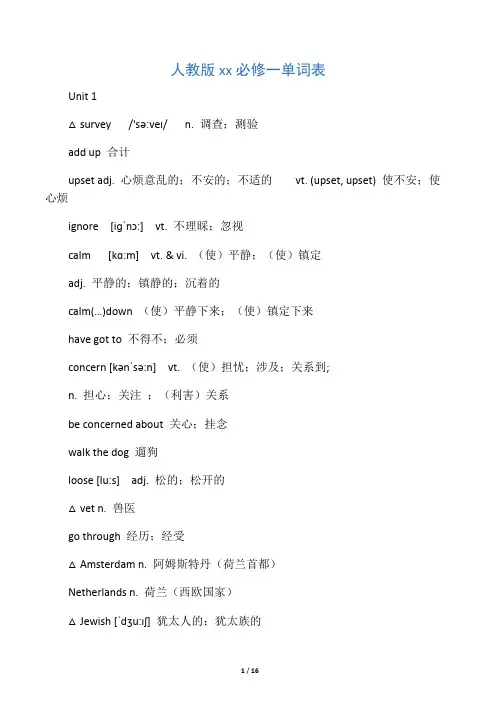
人教版xx必修一单词表Unit 1△survey /'səːveɪ/ n. 调查;测验add up 合计upset adj. 心烦意乱的;不安的;不适的vt. (upset, upset) 使不安;使心烦ignore [iɡˈnɔ:] vt. 不理睬;忽视calm [kɑ:m] vt. & vi. (使)平静;(使)镇定adj. 平静的;镇静的;沉着的calm(…)down (使)平静下来;(使)镇定下来have got to 不得不;必须concern [kənˈsə:n] vt. (使)担忧;涉及;关系到;n. 担心;关注;(利害)关系be concerned about 关心;挂念walk the dog 遛狗loose [lu:s] adj. 松的;松开的△vet n. 兽医go through 经历;经受△Amsterdam n. 阿姆斯特丹(荷兰首都)Netherlands n. 荷兰(西欧国家)△Jewish [ˈdʒu:ɪʃ] 犹太人的;犹太族的German [ˈdʒɜ:mən] adj. 德国的;德国人的;德语的; n.德国人;德语△Nazi n. 纳粹党人adj. 纳粹党的set down 记下;放下;登记series [ˈsiəri:z] n. 连续;系列a series of 一连串的;一系列;一套△Kitty n. 基蒂(女名)outdoors [ˈautdɔ:z] adv. 在户外;在野外△ spellbind [ˈspelˌbaɪnd] vt. (spellbound, spellbound) 迷住;迷惑on purpose [ˈpə:pəs]故意in order to 为了……dusk [dʌsk] n. 黄昏;傍晚at dusk 在黄昏时刻thunder [ˈθʌndə] vi. 打雷;雷鸣n.雷;雷声entire [inˈtaiə] adj. 整个的;完全的;全部的entirely adv. 完全地;全然地;整个地power [ˈpauə] n. 能力;力量;权力face to face 面对面地curtain [ˈkə:tn] n. 窗帘;门帘;幕布dusty [ˈdʌsti:] adj. 积满灰尘的no longer/not…any longer 不再……partner [ˈpɑ:tnə] n. 伙伴;合作者;合伙人settle [ˈsetl] vi. 安家;定居;停留vt. 使定居;安排;解决suffer [ ˈsʌfə] vt. & vi. 遭受;忍受;经历suffer from 遭受;患病△loneliness [ˈləʊnlɪnɪs] n. 孤单;寂寞highway n. 公路;大路recover [riˈkʌvə] vi. & vt. 痊愈;恢复;重新获得get/be tired of 对……厌烦pack [pæk] vi. & vt. 捆扎;包装;打行李n. 小包;包裹pack (sth) up 将(东西)装箱打包suitcase n. 手提箱;衣箱[ˈsju:tkeis]△Margot n. 玛戈(女名)Overcoat n. 大衣;外套teenager n. 十几岁的青少年[ˈti:neidʒə]get along with 与……相处;进展△gossip vi. & n. 闲话;闲谈[ˈɡɔsip]fall in love 相爱;爱上exactly adv. 确实如此;正是;确切地disagree vi. 不同意grateful adj. 感激的;表示谢意的[ˈɡreitful]dislike n. & vt. 不喜欢;厌恶join in 参加;加入tip n. 提示;技巧;尖;尖端;小费vt. 倾斜;翻倒△secondly adv. 第二;其次swap vt. 交换[swɔp]item n. 项目;条款[ˈaitəm]Unit 2△subway n. 地下人行道;<美>地铁elevator n. 电梯;升降机[ˈeliveitə]petrol n. <英>汽油(=<美>gasoline)[ˈpetrəl]gas n. 汽油;气体;煤气;毒气official adj. 官方的;正式的;公务的[əˈfiʃəl]voyage n. 航行;航海[ˈvɔiidʒ]△conquer vt. 征服;占领[ˈkɔŋkə]because of 因为;由于native adj. 本国的;本地的n. 本地人;本国人[ˈneitiv]△Amy n. 艾米(女名)apartment n. <美> 公寓住宅;单元住宅[əˈpɑ:tmənt] actually adv. 实际上;事实上[ˈæktʃu:əli:]AD 公元base vt. 以……为根据n. 基部;基地;基础[beis]at present 现在;目前[ˈprezənt]gradual adj. 逐渐的;逐步的[ˈɡrædjuəl]gradually adv. 逐渐地;逐步地Danish n. 丹麦语[ˈdenɪʃ]adj. 丹麦的;丹麦人的;丹麦语的△enrich vt. 使富裕;充实;改善[inˈritʃ]vocabulary n. 词汇;词汇量;词表[vəˈkæbjuləri]△Shakespeare 莎士比亚(英国剧作家,诗人)make use of 利用;使用spelling n. 拼写;拼法△Samuel Johnson 塞缪尔•约翰逊(英国作家,批评家)△Noah Webster 诺厄•韦伯斯特(美国词典编纂家)latter adj. 较后的;后半的;(两者中)后者的[ˈlætə] identity n. 本身;本体;身份[aiˈdentiti]fluent adj. 流利的;流畅的[ˈflu:ənt]fluently adv. 流利地;流畅地Singapore n. 新加坡(东南亚国家)Malaysia n. 马来西亚(东南亚国家);马来群岛[məˈleiʃə] such as 例如……;像这种的frequent adj. 频繁的;常见的[ˈfri:kwənt]frequently adv. 常常;频繁地usage n. 使用;用法;词语惯用法[ˈju:zidʒ,ˈjuːsɪdʒ]request n. & vt. 请求;要求[riˈkwest]△dialect n. 方言[ˈdaiəlekt]expression n. 词语;表示;表达[iksˈpreʃən]midwestern adj. 中西部的,有中西部特性的[ˈmidˈwestən] African adj. 非洲的;非洲人的;非洲语言的[ˈæfrɪkən] Spanish adj. 西班牙的;西班牙人的;西班牙语的[ˈspænɪʃ] n.西班牙人;西班牙语play a part (in) 扮演一个角色;参与eastern adj. 东方的;东部的southeastern adj. 东南方的;来自东南的morthwestern adj. 西北方的;来自西北的recognize vt. 辨认出;承认;公认[ˈrekəɡnaiz]lorry n. <英>卡车(=<美>truck)[ˈlɔri]△Lori n. 罗丽(女名)△Houston n. 休斯顿(美国城市)△Texas n. 德克萨斯州(美国州名)accent n. 口音;腔调;重音[ˈæksənt]△Buford n. 布福德(姓氏;男名)△Lester n. 莱斯特(姓错;男名)△catfish n. 鲶鱼lightning n. 闪电[ˈlaitniŋ]straight adv. 直接;挺直adj. 直的;笔直的;正直的[streit] block n. 街区;块;木块;石块 [blɔk]cab n. 出租车Unit 3journal n. 日记;杂志;定期刊物[ˈdʒə:nl]transport n. 运送;运输vt. 运输;运送[trænsˈpɔ:t] prefer vt. 更喜欢;选择某事物(而不选择其他事物)[priˈfə:] disadvantage n. 不利条件;不便之处[ˌdisədˈvɑ:ntidʒ]fare n. 费用[fɛə]△route n. 路线;路途 [ru:t]△Mekong n. 湄公河flow vi. 流动;流出n. 流动;流量[fləu]ever since 从那以后persuade vt. 说服;劝说[pəˈsweid]cycle vi. 骑自行车graduate vi. 毕业n. 大学毕业生[ˈɡrædjuit]finally adv. 最后;终于schedule n. 时间表;进度表vt. 为某事安排时间[ˈʃedju:əl] fond adj. 喜爱的;慈爱的;宠爱的be fond of 喜爱;喜欢stubborn adj. 顽固的;固执的[ˈstʌbən]organize vt. 组织;成立[ˈɔrɡəˌnaɪz]care about 关心;忧虑;惦念△detail n. 细节;详情[ˈdi:teil]△source n. 来源;水源[sɔ:s]determine vt. 决定;确定;下定决心[diˈtə:min] determined adj. 坚决的;有决心的change one’s mind 改变主意journey n. 旅行;旅程[ˈdʒə:ni]altitude n. 海拔高度;高处[ˈæltitju:d]make up one’s mind 下决心;决定give in 投降;屈服;让步△atlas n. 地图;地图集[ˈætləs]△glacier n. 冰河;冰川[ˈɡlæsjə]△Tibetan adj. 西藏的;藏族的;藏族人的[tɪˈbetn]n. (西)藏语;西藏人;藏族人△rapids n. 急流[ˈræpɪdz]valley n. (山)谷;流域[ˈvæli]△waterfall n. 瀑布pace vi. 缓慢而行;踱步n. 一步;速度;步调bend n. 弯;拐角vt. (bent, bent) 使弯曲vi. 弯身;弯腰△meander n. (指河流等)蜿蜒缓慢流动[mi:ˈændə]△delta n. 三角洲[ˈdeltə]attitude n. 态度;看法[ˈætitju:d]△Qomolangma n. 珠穆朗玛峰boil vi. (指液体)沸腾;(水)开[bɔil]forecast n. & vt. 预测;预报[ˈfɔ:-kɑ:st]parcel n. 小包;包裹[ˈpɑ:səl]insurance n. 保险[inˈʃuərəns]wool n. 羊毛;毛织品[wul]as usual 照常reliable adj. 可信赖的;可靠的[riˈlaiəbl]view n. 风景;视野;观点;见解vt. 观看;注视;考虑[vju:] △yak n. 牦牛pillow n. 枕头;枕垫[ˈpiləu]midnight n. 午夜;子夜at midnight 在午夜flame n. 火焰;光芒;热情[fleim]beneath prep. 在……下面[biˈni:θ]△Laos n. 老挝(东南亚国家)△Laotian n. 老挝人adj. 老挝(人)的temple n. 庙宇;寺庙[ˈtempl]cave n. 洞穴;地窖[keiv]Unit 4earthquake n. 地震[ˈə:θkweik]quake n. 地震right away 立刻;马上well n. 井△crack n. 裂缝;噼啪声vt. & vi. (使)开裂;破裂[kræk] △smelly adj. 发臭的;有臭味的[ˈsmeli:]△farmyard n. 农场;农家[ˈfɑ:mˌjɑ:d]pipe n. 管;导管burst vi. (burst, burst) 爆裂;爆发n. 突然破裂;爆发[bə:st] million n. 百万[ˈmiljən]event n. 事件;大事[iˈvent]as if 仿佛;好像at an end 结束;终结nation n. 民族;国家;国民[ˈneiʃən]canal n. 运河;水道[kəˈnæl]steam n. 蒸汽;水汽[sti:m]dirt n. 污垢;泥土ruin n. 废墟;毁灭vt. 毁灭;使破产[ˈruin]in ruins 严重受损;破败不堪suffering n. 苦难;痛苦[ˈsʌfərɪŋ, ˈsʌfrɪŋ]extreme adj. 极度的[iksˈtri:m]injure vt. 损害;伤害[ˈindʒə]△survivor n. 幸存者;生还者;残存物[səˈvaivə]destroy vt. 破坏;毁坏;消灭[disˈtrɔi]brick n. 砖;砖块[brik]dam n. 水坝;堰堤damtrack n. 轨道;足迹;痕迹[træk]useless adj. 无用的;无效的;无益的[ˈju:slis]shock vt. & vi. (使)震惊;震动n. 休克;打击;震惊[ʃɔk] rescue n. & vt. 援救;营救[ˈreskju:]trap vt. 使陷入困境n. 陷阱;困境[træp]electricity n. 电;电流;电学[ilekˈtrisiti]disaster n. 灾难;灾祸[diˈzɑ:stə]dig out 掘出;发现bury vt. 埋葬;掩埋;隐藏[ˈberi]mine n. 矿;矿山;矿井miner n. 矿工shelter n. 掩蔽;掩蔽处;避身处[ˈʃeltə]a (great) number of 许多;大量的title n. 标题;头衔;资格[ˈtaitl]reporter n. 记者[riˈpɔ:tə]bar n. 条;棒;条状物damage n. & vt. 损失;损害[ˈdæmidʒ]frighten vt. 使惊吓;吓唬[ˈfraitən]frightened adj. 受惊的;受恐吓的frightening adj. 令人恐惧的congratulation n. 祝贺;(复数)贺词[kənˌɡrætjuˈleiʃən] judge n. 裁判员;法官vt. 断定;判断;判决[dʒʌdʒ] sincerely adv. 真诚地;真挚地[sɪnˈsɪəlɪ]express vt. 表示;表达n. 快车;速递[iksˈpres] outline n. 要点;大纲;轮廓[ˈautlain]headline n. 报刊的大字标题cyclist n. 骑自行车的人[ˈsaɪklɪst]Unit 5△Nelson Mandela纳尔逊•曼德拉(前南非共和国总统)quality n. 质量;品质;性质[ˈkwɔliti]△warm-hearted adj. 热心肠的mean adj. 吝啬的;自私的;卑鄙的active adj. 积极的;活跃的generous adj. 慷慨的;大方的[ˈdʒenərəs]△easy-going adj. 随和的,温和宽容的self n. 自我;自身selfish adj. 自私的[ˈselfiʃ]selfless adj. 无私的;忘我的[ˈselflɪs]selflessly adv. 无私地;忘我地devote vt. (与to连用)献身;专心于[diˈvəut]devoted adj. 忠实的;深爱的△William Tyndale 威廉•廷代尔(英国早期新教改革者)△Bible n. 《圣经》△Norman Bethune 诺曼•白求恩(加拿大胸外科医师)△invader n. 侵略者[ɪnˈveɪdə]found vt. 建立;建设republic n. 共和国;共和政体[riˈpʌblik]principle n. 法则;原则;原理[ˈprinsəpl]△nationalism n. 民族主义;国家主义[ˈnæʃənəˌlɪzəm, ˈnæʃnə-] △livelihood n. 生计;谋生[ˈlaɪvli:ˌhʊd]△Mohandas Gandhi 莫罕达斯•甘地(印度国民大会党领袖)peaceful adj. 和平的;平静的;安宁的[ˈpi:sful]△giant adj. 巨大的;庞大的[ˈdʒaiənt]△leap n. 飞跃;跳跃[li:p]mankind n. 人类[mænˈkaind]△Elias n. 伊莱亚斯(男名)lawyer n. 律师[ˈlɔ:jə]guidance n. 指导;领导[ˈɡaidəns]legal adj. 法律的;依照法律的[ˈli:ɡəlfee n. 费(会费、学费等);酬金[fi:]△passbook n. 南非共和国有色人种的身份证△Johannesburg n. 约翰内斯堡(南非城市)out of work 失业hopeful adj. 怀有希望的;有希望的△ANC 非国大;非洲人国民大会;非洲民族会议(African National Congress)youth n. 青年;青年时期[ju:θ]league 同盟;联盟;联合会[li:ɡ]Youth League 青年团stage n. 舞台;阶段;时期[steidʒ]vote vt. & vi. 投票;选举n. 投票;选票;表决[vəut]attack vt. 进攻;攻击;抨击[əˈtæk]violence n. 暴力;暴行[ˈvaiələns]as a matter of fact 事实上blow up 使充气;爆炸equal adj. 相等的;平等的[ˈi:kwəl]in trouble 在危险、受罚、痛苦、忧虑等的处境中willing adj. 乐意的;自愿的unfair adj. 不公正的;不公平的[ʌnˈfeə]turn to 求助于;致力于△ quote n. 引用语;语录[kwəut]△ release vt. 释放;发行[riˈli:s]lose heart 丧失勇气或信心△Robben Island 罗本岛[ˈailənd]escape vi. 逃脱;逃走;泄露[isˈkeip]blanket n. 毛毯;毯子[ˈblæŋkit]educate vt. 教育;训练[ˈedju:keit]educated adj. 受过教育的;有教养的beg vi. 请求;乞求relative n. 亲戚;亲属[ˈrelətiv]terror n. 恐怖;可怕的人;恐怖时期;恐怖活动[ˈterə] cruelty n. 残忍;残酷[ˈkru:əlti:]reward n. 报酬;奖金vt. 酬劳;奖赏[riˈwɔ:d]△Transkei n. 特兰斯凯(南非东南部一地区)set up 设立;建立sentence vt. 判决;宣判[ˈsentəns]be sentenced to 被判处……(徒刑)anti-[前缀] 反;抗;阻anti-black adj. 反黑人的△Cape Town 开普敦(南非立法首都)president n. 总统;会长;校长;行长[ˈprezidənt] △Nobel Peace Prize 诺贝尔和平奖opinion n. 意见;看法;主张[əˈpinjən]。
![[新教材]人教版(2019)高中英语必修一话题作文与范文10篇](https://uimg.taocdn.com/9c122bdd52ea551810a687da.webp)
[新教材]人教版(2019)高中英语必修一话题作文与范文10篇【作文一】话题:自我介绍(Welcome Unit)国际文化交流中心将组织一次由各国学生参加的“和平、友谊”夏令营活动,要求提名者提交英文个人简历。
假设你是李华,16岁,晨光中学高一学生,请根据下列信息写一篇个人简历。
1. 爱好音乐、摄影,善于与人交流。
2. 乐于助人,热爱自然,热爱和平。
3. 参加夏令营的目的:结交朋友,了解外国文化(foreign cultures)。
参考词汇:和平友谊夏令营Peace and Friendship Summer Camp要求:1. 词数100词左右;2. 不要逐字翻译,要组成一篇通顺连贯的短文;Dear Sir or Madam,My name is Li Hua, a student studying in Chenguang Senior High School. Learning that the Peace and Friendship Summer Camp to be held by International Culture Communication Centre is approaching, I'm writing to apply for it.First and foremost, I have great passion for music and photography, and I always enjoy music in my spare time. Besides, as a kind person who loves nature and peace, I am confident that I can promote a bettercommunication with others. Last but not least, not only can I make more friends, but also I can learn more about foreign cultures.Should this application meet with your favorable consideration, I will do my utmost to justify the confidence you repose in me.Yours truly,Li Hua【作文二】话题:校园生活(Unit1 Teenage Life)假定你是李华,是学校英文报“Advice”栏目的编辑。
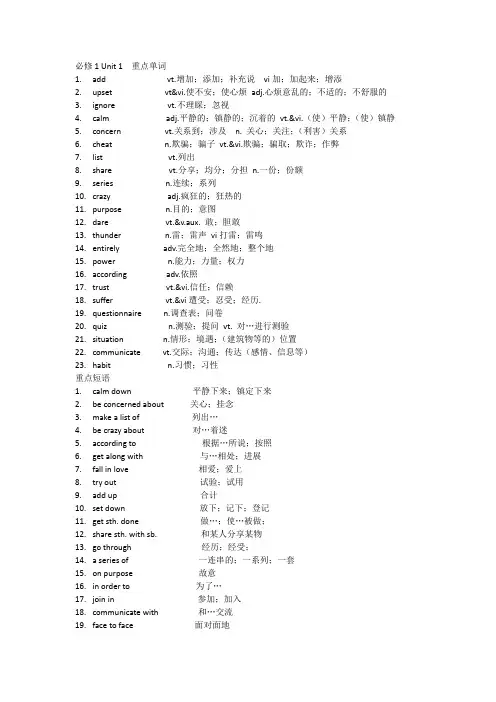
必修1 Unit 1 重点单词1.add vt.增加;添加;补充说vi加;加起来;增添2.upset vt&vi.使不安;使心烦adj.心烦意乱的;不适的;不舒服的3.ignore vt.不理睬;忽视4.calm adj.平静的;镇静的;沉着的vt.&vi.(使)平静;(使)镇静5.concern vt.关系到;涉及n. 关心;关注;(利害)关系6.cheat n.欺骗;骗子vt.&vi.欺骗;骗取;欺诈;作弊7.list vt.列出8.share vt.分享;均分;分担n.一份;份额9.series n.连续;系列10.crazy adj.疯狂的;狂热的11.purpose n.目的;意图12.dare vt.&v.aux. 敢;胆敢13.thunder n.雷;雷声vi打雷;雷鸣14.entirely adv.完全地;全然地;整个地15.power n.能力;力量;权力16.according adv.依照17.trust vt.&vi.信任;信赖18.suffer vt.&vi遭受;忍受;经历.19.questionnaire n.调查表;问卷20.quiz n.测验;提问vt. 对…进行测验21.situation n.情形;境遇;(建筑物等的)位置municate vt.交际;沟通;传达(感情、信息等)23.habit n.习惯;习性重点短语1.calm down 平静下来;镇定下来2.be concerned about 关心;挂念3.make a list of 列出…4.be crazy about 对…着迷5.according to 根据…所说;按照6.get along with 与…相处;进展7.fall in love 相爱;爱上8.try out 试验;试用9.add up 合计10.set down 放下;记下;登记11.get sth. done 做…;使…被做;12.share sth. with sb. 和某人分享某物13.go through 经历;经受;14. a series of 一连串的;一系列;一套15.on purpose 故意16.in order to 为了…17.join in 参加;加入municate with 和…交流19.face to face 面对面地20.suffer from 遭受。
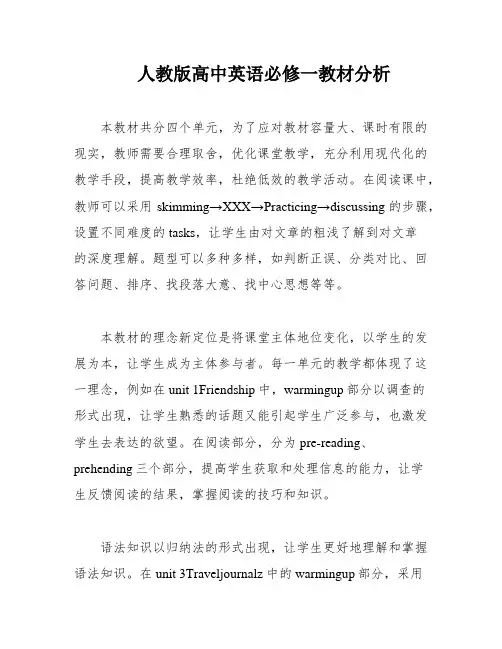
人教版高中英语必修一教材分析本教材共分四个单元,为了应对教材容量大、课时有限的现实,教师需要合理取舍,优化课堂教学,充分利用现代化的教学手段,提高教学效率,杜绝低效的教学活动。
在阅读课中,教师可以采用skimming→XXX→Practicing→discussing的步骤,设置不同难度的tasks,让学生由对文章的粗浅了解到对文章的深度理解。
题型可以多种多样,如判断正误、分类对比、回答问题、排序、找段落大意、找中心思想等等。
本教材的理念新定位是将课堂主体地位变化,以学生的发展为本,让学生成为主体参与者。
每一单元的教学都体现了这一理念,例如在unit 1Friendship中,warmingup部分以调查的形式出现,让学生熟悉的话题又能引起学生广泛参与,也激发学生去表达的欲望。
在阅读部分,分为pre-reading、prehending三个部分,提高学生获取和处理信息的能力,让学生反馈阅读的结果,掌握阅读的技巧和知识。
语法知识以归纳法的形式出现,让学生更好地理解和掌握语法知识。
在unit 3Traveljournalz中的warmingup部分,采用填表格的形式,让学生对比各个不同交通运输方式的优点和缺点,增强学生的课堂参与度。
课文中的语法知识、听力部分以及写作部分,都紧紧围绕一个话题展开,全面提升学生的听说读写能力。
After the new curriculum reform。
XXX n。
which XXX disadvantages。
XXX。
XXX method should be an organic n of n and n。
requiring us to take the strengths of both methods andteach grammar knowledge well。
This is XXX.XXX model is task-based language teaching。
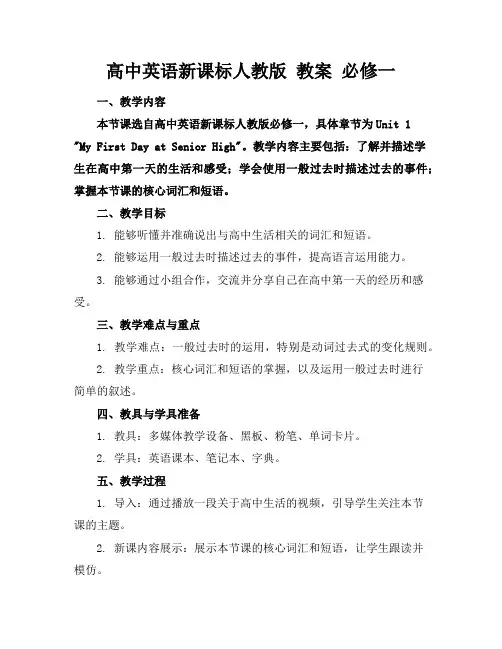
高中英语新课标人教版教案必修一一、教学内容本节课选自高中英语新课标人教版必修一,具体章节为Unit 1 "My First Day at Senior High"。
教学内容主要包括:了解并描述学生在高中第一天的生活和感受;学会使用一般过去时描述过去的事件;掌握本节课的核心词汇和短语。
二、教学目标1. 能够听懂并准确说出与高中生活相关的词汇和短语。
2. 能够运用一般过去时描述过去的事件,提高语言运用能力。
3. 能够通过小组合作,交流并分享自己在高中第一天的经历和感受。
三、教学难点与重点1. 教学难点:一般过去时的运用,特别是动词过去式的变化规则。
2. 教学重点:核心词汇和短语的掌握,以及运用一般过去时进行简单的叙述。
四、教具与学具准备1. 教具:多媒体教学设备、黑板、粉笔、单词卡片。
2. 学具:英语课本、笔记本、字典。
五、教学过程1. 导入:通过播放一段关于高中生活的视频,引导学生关注本节课的主题。
2. 新课内容展示:展示本节课的核心词汇和短语,让学生跟读并模仿。
3. 例题讲解:以"Yesterday was my first day at senior high. I"为例,讲解一般过去时的用法。
4. 随堂练习:让学生运用一般过去时,描述自己在高中第一天的经历。
5. 小组活动:学生分成小组,互相交流并分享自己的经历,提高语言表达能力。
六、板书设计1. 核心词汇和短语:写在黑板的左边,方便学生查看。
2. 一般过去时的结构:写在黑板的右边,突出教学重点。
七、作业设计1. 作业题目:请用一般过去时描述你昨天的一天。
2. 答案示例:Yesterday was my busy day. I got up at 6:00, had breakfast and went to school. In the morning, I had four classes. After lunch, I played basketball with my friends. In the evening, I did my homework and watched TV.八、课后反思及拓展延伸1. 课后反思:本节课学生对于一般过去时的掌握程度较好,但仍有个别学生动词过去式变化不准确,需加强练习。
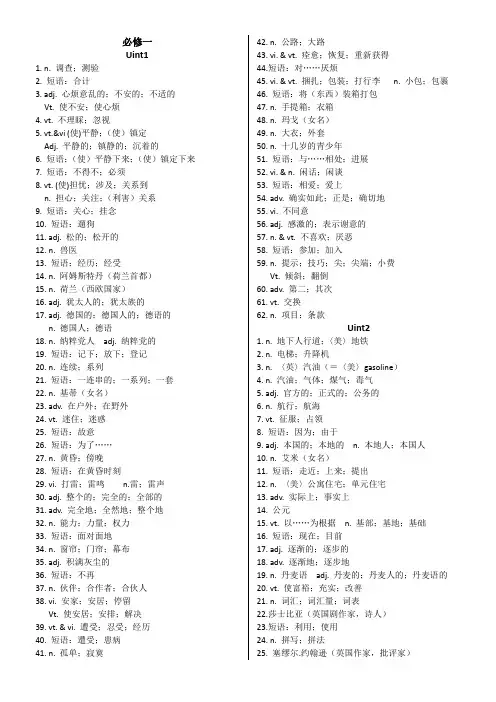
必修一Uint11. n. 调查;测验2. 短语:合计3. adj. 心烦意乱的;不安的;不适的Vt. 使不安;使心烦4. vt. 不理睬;忽视5. vt.&vi (使)平静;(使)镇定Adj. 平静的;镇静的;沉着的6. 短语:(使)平静下来;(使)镇定下来7. 短语:不得不;必须8. vt. (使)担忧;涉及;关系到n. 担心;关注;(利害)关系9. 短语:关心;挂念10. 短语:遛狗11. adj. 松的;松开的12. n. 兽医13. 短语:经历;经受14. n. 阿姆斯特丹(荷兰首都)15. n. 荷兰(西欧国家)16. adj. 犹太人的;犹太族的17. adj. 德国的;德国人的;德语的n. 德国人;德语18. n. 纳粹党人adj. 纳粹党的19. 短语:记下;放下;登记20. n. 连续;系列21. 短语:一连串的;一系列;一套22. n. 基蒂(女名)23. adv. 在户外;在野外24. vt. 迷住;迷惑25. 短语:故意26. 短语:为了……27. n. 黄昏;傍晚28. 短语:在黄昏时刻29. vi. 打雷;雷鸣n.雷;雷声30. adj. 整个的;完全的;全部的31. adv. 完全地;全然地;整个地32. n. 能力;力量;权力33. 短语:面对面地34. n. 窗帘;门帘;幕布35. adj. 积满灰尘的36. 短语:不再37. n. 伙伴;合作者;合伙人38. vi. 安家;安居;停留Vt. 使安居;安排;解决39. vt. & vi. 遭受;忍受;经历40. 短语:遭受;患病41. n. 孤单;寂寞42. n. 公路;大路43. vi. & vt. 痊愈;恢复;重新获得44.短语:对……厌烦45. vi. & vt. 捆扎;包装;打行李n. 小包;包裹46. 短语:将(东西)装箱打包47. n. 手提箱;衣箱48. n. 玛戈(女名)49. n. 大衣;外套50. n. 十几岁的青少年51. 短语:与……相处;进展52. vi. & n. 闲话;闲谈53. 短语:相爱;爱上54. adv. 确实如此;正是;确切地55. vi. 不同意56. adj. 感激的;表示谢意的57. n. & vt. 不喜欢;厌恶58. 短语:参加;加入59. n. 提示;技巧;尖;尖端;小费Vt. 倾斜;翻倒60. adv. 第二;其次61. vt. 交换62. n. 项目;条款Uint21. n. 地下人行道;〈美〉地铁2. n. 电梯;升降机3. n. 〈英〉汽油(=〈美〉gasoline)4. n. 汽油;气体;煤气;毒气5. adj. 官方的;正式的;公务的6. n. 航行;航海7. vt. 征服;占领8. 短语:因为;由于9. adj. 本国的;本地的n. 本地人;本国人10. n. 艾米(女名)11. 短语:走近;上来;提出12. n. 〈美〉公寓住宅;单元住宅13. adv. 实际上;事实上14. 公元15. vt. 以……为根据n. 基部;基地;基础16. 短语:现在;目前17. adj. 逐渐的;逐步的18. adv. 逐渐地;逐步地19. n. 丹麦语adj. 丹麦的;丹麦人的;丹麦语的20. vt. 使富裕;充实;改善21. n. 词汇;词汇量;词表22.莎士比亚(英国剧作家,诗人)23.短语:利用;使用24. n. 拼写;拼法25. 塞缪尔.约翰逊(英国作家,批评家)26. 诺厄.韦伯斯特(美国词典纂家)27. adj. 较后的;后半的;(两者中)后者的28. n. 本身;本体;身份29. adj. 流利的;流畅的30. adv. 流利地;流畅地31. n. 新加坡(东南亚国家)32. n. 马来西亚(东南亚国家);马来群岛33. 短语:例如……;像这种的34. adj. 频繁的;常见的35. adv. 常常;频繁地36. n. 使用;用法;词语惯用法37. n. & vt. 命令;指令;掌握38. n. & vt. 请求;要求39. n. 方言40. n. 词语;表示;表达41. adj. 中西部的;有中西部特性的42. adj. 非洲的;非洲人的;非洲语言的43. adj. 西班牙的;西班牙人的;西班牙语的n. 西班牙人;西班牙语44. 短语:扮演一个角色;参与46. adj. 东方的;东部的47. adj. 东南方的;来自东南的48. adj. 西北方的;来自西北的49. vt. 辨认出;承认;公认50. n. 〈英〉卡车(=〈美〉truck)51. n. 萝丽(女名)52. n. 休斯敦(美国城市)53. n. 得克萨斯州(美国州名)54. n. 口音;腔调;重音55. n. 布福德(姓氏;男名)56. n. 莱斯特(姓氏;男名)57. n. 鲶鱼58. n. 闪电59. adv. 直接;挺直adj. 直的;笔直的;正直的60. n. 街区;块;木块;石块61. n. 出租车Uint31. n. 日记;杂志;定期刊物2. n. 运送;运输vt. 运输;运送3. vt. 更喜欢;选择某事物(而不选择其他事物)4. n. 不利条件;不便之处5. n. 费用6. n. 路线;路途7. n. 湄公河8. vi. 流动;流出n.流动;流量9. 短语:自从;自……以后10. vt. 说服;劝说11. vi. 骑自行车12. vi. 毕业n. 大学毕业生13. adv. 最后;终于14. n. 时间表;进度表vt. 为某事安排时间15. adj. 喜爱的;慈爱的;宠爱的16. 短语:喜爱;喜欢17. n. 缺点18.adj. 顽固的;固执的19. vt. 组织;成立20.短语:关心;忧虑;惦念21.△n. 细节;详情22.△n. 来源;水源23. vt. 决定;确定;下定决心24. adj. 坚决的;有决心的25.短语:改变主意26.n. 旅行;旅程27. n. 海拔高度;高处28.短语:下决心;决定29. 短语:投降;屈服;让步30.△n. 地图;地图集31.△n. 冰河;冰川32.△adj. 西藏的;藏族的;藏族人的;n. (西)藏语;西藏人;藏族人33.△n. 急流34.n. (山)谷;流域35.△n. 瀑布36. vi. 缓慢而行;踱步n. 一步;速度;步调37. n. 弯;拐角vt. (bent, bent) 使弯曲vi. 弯身;弯腰38.△n. (指河流等)蜿蜒缓慢流动39.△n. 三角洲40. n. 态度;看法41.△n. 珠穆朗玛峰42. vi. (指液体)沸腾;(水)开43. n. & vt. 预测;预报44.n. 小包;包裹45.n. 保险46.l n. 羊毛;毛织品47. 短语:照常48. adj. 可信赖的;可靠的49. n. 风景;视野;观点;见解vt. 观看;注视;考虑50.△n. 牦牛51. n. 枕头;枕垫52. n. 午夜;子夜53. 短语:在午夜54. n. 火焰;光芒;热情55. prep. 在……下面56.△n. 老挝(东南亚国家)57.△n. 老挝人adj. 老挝(人)的58. n. 庙宇;寺庙59. n. 洞穴;地窖Unit 41.n. 地震2.n. 地震3. 短语:立刻;马上4. n. 井5.△n. 裂缝;噼啪声vt. & vi. (使)开裂;破裂6.△adj. 发臭的;有臭味的7.△n. 农场;农家8. n. 管;导管9. vi.爆裂;爆发n. 突然破裂;爆发10. n. 百万11. n. 事件;大事12. 短语:仿佛;好像13. 短语:结束;终结14. n. 民族;国家;国民15. n. 运河;水道16. n. 蒸汽;水汽17. n. 污垢;泥土18. n. 废墟;毁灭vt. 毁灭;使破产19. 短语:严重受损;破败不堪20. n. 苦难;痛苦21. adj. 极度的22. vt. 损害;伤害23.△n. 幸存者;生还者;残存物24. vt. 破坏;毁坏;消灭25. n. 砖;砖块26. n. 水坝;堰堤27. n. 轨道;足迹;痕迹28. adj. 无用的;无效的;无益的29. vt. & vi. (使)震惊;震动n. 休克;打击;震惊30. n. & vt. 援救;营救31. vt. 使陷入困境n. 陷阱;困境32. n. 电;电流;电学33. n. 灾难;灾祸34. 短语:掘出;发现35. vt. 埋葬;掩埋;隐藏36. n. 矿;矿山;矿井37. n. 矿工38. n. 掩蔽;掩蔽处;避身处39. 短语:许多;大量的40.n. 标题;头衔;资格41. n. 记者42. n. 条;棒;条状物43.n. & vt. 损失;损害44. vt. 使惊吓;吓唬45. adj. 受惊的;受恐吓的46. adj. 令人恐惧的47. n. 祝贺;(复数)贺词48. n. 裁判员;法官vt. 断定;判断;判决49. adv. 真诚地;真挚地50. vt. 表示;表达n. 快车;速递51. n. 要点;大纲;轮廓52. n. 报刊的大字标题53. n. 骑自行车的人Unit 51. n. 质量;品质;性质2.△adj. 热心肠的3. adj. 吝啬的;自私的;卑鄙的4. adj. 积极的;活跃的5. adj. 慷慨的;大方的6.△adj. 随和的;温和宽容的7. n. 自我;自身8. adj. 自私的9. adj. 无私的;忘我的10. adv. 无私地;忘我地11. vt. (与to连用)献身;专心于12. adj. 忠实的;深爱的13.△n. 《圣经》14.△n. 侵略者15. vt. 建立;建设16. n. 共和国;共和政体17. n. 法则;原则;原理18.△n. 民族主义;国家主义19.△n. 生计;谋生20. adj. 和平的;平静的;安宁的21.△adj. 巨大的;庞大的22.△n. 飞跃;跳跃23. n. 人类24. n. 律师25. n. 指导;领导26. adj. 法律的;依照法律的27. n. 费(会费、学费等);酬金28.△n. 南非共和国有色人种的身份证29. 短语:失业30. adj. 怀有希望的;有希望的31.△非国大;非洲人国民大会;非洲民族会议32. n. 青年;青年时期33. n. 同盟;联盟;联合会34. 短语:青年团35. n. 舞台;阶段;时期36. vt. & vi. 投票;选举n. 投票;选票;表决37. vt. 进攻;攻击;抨击38. n. 暴力;暴行39. 短语:事实上40. 短语:使充气;爆炸41. adj. 相等的;平等的42. 短语:在危险、受罚、痛苦、忧虑等的处境中43. adj. 乐意的;自愿的44.adj. 不公正的;不公平的45短语:求助于;致力于46.△n. 引用语;语录47.△vt. 释放;发行48. 短语:丧失勇气或信心49. vi. 逃脱;逃走;泄露50. n. 毛毯;毯子51. vt. 教育;训练52.adj. 受过教育的;有教养的53. 短语:当权;上台54. vi. 请求;乞求55. n. 亲戚;亲属56. n. 恐怖;可怕的人;恐怖时期;恐怖活动57. n. 残忍;残酷58. n. 报酬;奖金vt. 酬劳;奖赏59. 短语:设立;建立60. vt. 判决;宣判61. 短语:被判处……(徒刑)62.[前缀] 反;抗;阻63. adj. 反黑人的64. n. 总统;会长;校长;行长65.△诺贝尔和平奖66. n. 意见;看法;主张。

史上最全面的人教版高中英语必修一语法知识点总结高一主要语法点必修一:直接引语和间接引语(宾语从句);现在进行时表将来;定语从句必修二:定语从句(非限定定从、定从中的介词前提);被动语态(一般将来时、现在完成时及现在进行时的被动语态)必修三:情态动词;名词性从句(主语从句、宾语从句、表语从句及同位语从句) 必修四:主谓一致;非谓语动词(V-ing) ;构词法必修2 第一单元,非限制性定语从句的第二单元一般将来时的主被动第三单元现在完成时的主被动第四单元现在进行时的主被动第五单元介词+which/whom的用法必修3一二单元情态动词的用法三单元宾语从句和表语从句四单元主语从句五单元同位语从句必修4 第一单元主谓一致第二单 v-ing作主语和宾语的用法第三单元 v-ing作表语,定语和宾语补足语第四单元 v-ing作状语第五单元构词法必修5第一单元过去分词作定语和表语第二单元过去分词作宾语补足语第三单元过去分词作状语第四单元倒装句第五单元省略句Unit One Friendship一、重点短语9. join in 参加(一些活动); take part in 参加(活动) join 加入(组织,团队,并成为其中一员) 10. calm down 冷静下来 11. suffer from 遭受12. be/get tired of…对…感到厌倦 13. be concerned about 关心14. get on/along well with 与…相处融洽 15. be good at/do well in 擅长于… 16. find it + adj. to do sth. 发现做事是… 17. no longer / not …any longer 不再…18. too much 太多(后接不可数n.) much too 太…(后接adj.)19. not…until 直到… 才20. it’s no pleasure doing sth 做… 并不开心21. make sb. sth. 使人成为… make sb. do sth. 使人做事二、语法----直接引语和间接引语概念:直接引语:直接引述别人的原话。
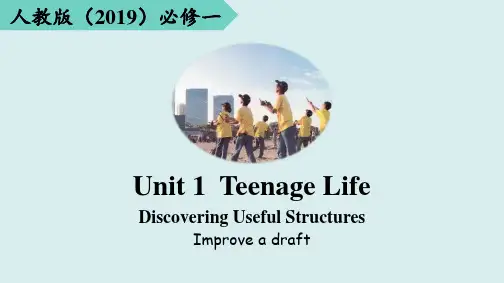
新版人教版必修一词汇表Welcome Unitexchang. n.交换;交.vt.交换;交流;交易;兑换lectur. n.讲座;讲课:;教.vi.(开)讲座;讲. vt.训斥registration n.登记;注册;挂号registe. vt.&vi.登记;注册se. n.性别femal. adj.女(性)的;雌.n.雌性动(植)物;女子mal. adj.男(性)的;雄.n.雄性动(植)物;男子nationalit. n.国籍;民族natio. n.国家;民族;国民designer n.设计者design n.设计;设计方案vt.设计;筹划campu. n.校园;校区formal adj.正式的;正规的anxious adj.焦虑的;不安的annoyed adj.恼怒的;生气的annoy vt.使恼怒;打扰frightene. adj.惊吓的;害怕的p.m. abr.(源自拉丁语)下午;午后a.m. abb. (源自拉丁语)上年;午前;午夜至正午senio. adj.级别(或地位)高.n.较年长的人senior high school (美国)高中at last终于;最终outgoin. adj.爱交际的;外向的impression n.印象;感想impres. vt.使钦佩.给…留下深刻的好印象vi.留下印象;引人注目make an impression留下好印象what if要是……会怎么样呢?guy n.小伙子;男人;家伙concentrate vi.&.集中(注意力);聚精会神concentrate on集中精力于experiment n.实验;试验leave...alone不打扰;不惊动awkward adj.令人尬的;难对付的junior adj.地位(或职位、级别)低下的n.职位较低者;(体育运动中)青少年junior high school(美国)初级中学explore vt.&vi.探索;物探confident adi.自信的;有把握的confidence n.信心;信任forward adv.( also forwards)向前;前进adj.向前的;前进的look forward to盼望;期待take notes记笔记flash n.光;信号vi.闪耀;闪光;发出信号vt.使闪耀;发出(信号)flash card 教学卡片;识字卡organise (NAME -ize) vt.组织;等备;安排;组建vi.组建;成立organisation (Nam -ization)n.组织;团体;机构goal n.目标;球门;射门strategy n.策略;策划partner n.同伴;配偶;合伙人improv. vi.&vt.改进;改善curiou. adj.好奇的;求知欲强的company n.公司;商行;伴personality n性格;个性style n.方式;作风revise vt&vi.修改;修订;复习Unit 1teenageadj.十几岁的(指13至19岁);青少年的teenagern.(13至19岁之间的)青少年ballet n.芭蕾舞volunteer n志愿者debaten.辩论;争. vt.&vi.辩论;争论prefer vt.较喜欢prefer…to...喜欢……多于...... content n.内容;[pl]目录; (书、讲话、节目等的)主题movement n.动作;运动;活动greenhouse n, 温室;暖房clean up打扫(或清除)干净suitable adj.合适的;适用的suitable for对……适合的actually adv.事实上;的确challenge n.挑战;艰巨任务vt.怀疑;向……挑战title n.(书、诗歌等的)名称; 标题;职称;头衔topic n.话题;标题freshman n ( especially NAmE)(中学)九年级学生;(大学)一年级新生confusing adj.难以理解的;不清楚的confuse vt.使糊涂;使迷感confused adj.涂的;迷感的fluent adj.(尤指外语)流利的;熟练的graduate vi.&vt.毕业;获得学位n.毕业生recommend vt.建议;推荐;介绍sign up (for sth)报名(参加课程) advanced a.高级的;高等的;先进的advance n.前进;发展vi.前进;发展vt.发展;促进literature n.文学;:文学作品extra-curricularadj.课外的;课程以外的extra adj.额外的;附加的obviously adv.然:;明显地quit vi.&vt.(quit, quit )停止;戒掉:离开(工作职位、学校等)responsible adj.负责的;有责任的responsibility n.责任;义务be responsible for对负责solution n.解决办法;答案schedule n.工作计划;日程安排vt.安排;预定editor n.主编;编辑;编者plate n.盘子;子adventure n.冒险;奇遇youth n.青年时期;青春survival n.生存;幸存;幸存事物expert n.专家;行家adj.熟练的;内行的;专家的behaviour n.行为;举止generation n.一代(人)attract vt.吸引;引起………的注意(或兴趣)be attracted to喜爱focus vi.&vt.集中(精力、注意力等);(使)调节焦距n.中心;重点;焦点focus on集中;特别关注addicte. adj.有瘾的;上瘾的;入迷的addic. n.对……入迷的人;吸毒成瘾的人addicted to对……很入迷adul..n.成年..adj.成年的;成熟的Chicago 芝加哥(美国城市)Seoul 首尔(韩国首都)Unit 2castl..n.城堡;堡全appy vi.&vt.申请:请求vi.应用;涂(油漆、乳剂)apply for申请visa n.签证rent vt .租用;出租vi.租用;租金..n.租金pac. vi.&vt.收给(行李. vt.包装n.(商品的)纸包;纸;大包amazing adj.今人惊奇的:今人惊喜的amazed adj.惊奇的;惊喜的arrangement n.安排:等备extremely adv, 极其;非常source n, 来源;出处narrow adj.狭窄的vi.&vt.(使)变窄flat adj.平坦的;扁平的n.公寓;单元房powerful adj.强有力的;有权势的;有影响力的empire n.帝国emperor n.皇帝site n.地点;位置;现场take control of控制;接管official adj.官方的;正式的;公务的n.官员;要员recognise (NAME -ize) vt.辨别出;承认;认可type n.类型;种类vi.&vt.打字flight n.空中航行;航班;航程accommodation n.住处;停留处;膳宿unique adj.唯一的;独特的;特有的path n.小路;路线;道路destination n.目的地;终点other than除……以外admire vt.钦佩;赞赏architecture n.建筑设计;建筑学architect n.建筑设计师brochure n.资料(或广告)手册package n.包;包装盒vt.将…包装好package tour包价旅游contact vt.联络;联系n.联系;接触civilisation n.文明;文明世界make up构成;形成soldier n.士兵;军人transport n .vt.运输;运送hike vi.徒步旅行vt.去......远. n.远足;徒步旅行economy n.经济;节约economic adj.经济(上)的;经済学的credit n.借款;信用;称赞;学分credit card信用卡detai. n.细节;详情;细微之处check in(在旅馆、机场等)登记check out结账离开(旅馆等)request n.(正式或礼貌的)要求;请求vt.(正式或礼貌地)要求;请求view n.视野;景色;看法sight n.景象;视野;视力statu. n.雕塑;雕像BCE (= before the Common Era)公元前tomb n.坟墓unearth vt.挖掘;发掘comment n.议论;评论vi.&vt.发表意见;评论the Eiffel Tower 埃菲尔铁塔Neuschwanstein Castle 新天鹅堡Iceland 冰岛(国家名)Disneyland 迪士尼乐园Peru 秘鲁(国家名)the Andes Mountains安第斯山脉the Amazon rainforest亚马孙南林the Inca Empire印加帝国Machu Picchu 马丘比丘Spain 西班牙(国家名)Spanish n.西班牙语;西班牙人adj.西班牙的Cusco 库斯科(秘鲁城市)Lake Titicaca 的的喀喀湖the Uros 乌鲁斯人the Terracotta Army兵马俑Unit 3fitnes. n.健康:健壮;适合socce. n.足球;足球运动stadiu. n.(pl. stadium.o.stadia. 体育场;运动场boxin.n.拳击(运动)badminton n, 羽毛球运动marathon n.马拉松赛跑event n.比赛项目;大事;公开活动come along跟随;到达;进步;赶快sk. adj.滑雪. vi.滑雪host vt.主办;主持n.主人;东道主;节目主持人trac. n.跑道;足迹;铁路轨.vt.&vi.追踪;跟踪track and field田径gy. n.健身房;体育馆gymnastics n.体操(训练)work out锻炼;计算出;解决sweat vt.使出汗;出汗弄湿vi.出汗;流..n.汗水;出汗make it获得成功;准时到达legend n.传奇故事(或人物】;传说athlete n.运动员;运动健儿master n.高手;主人vt.精通;掌握set an example树立榜样honour n.荣誉;尊敬;荣幸glory n.荣誉;光荣;赞美medal n.奖章;勋章championship n.锦标赛;冠军赛;冠军称号champion n.冠军;忧胜者determination n.决心;决定apart adv.分离;分开;成碎片fall apart破裂;破碎;崩溃injure vt.使受伤:损害injured adj.受伤的;有伤的injur. n.伤害;伤captain n.(运动队)队长;船长:机长lose heart丧失信心;泄气graceful adj.优美的;优推的strength n.力量;体力failure n.失败;失败的人(或事物) give up 放弃;投降compete vi.竟争;对抗make sense有道理:合乎情理:表清楚preten. vt.&vi.假装:装粉pretend to do sth假装做某事even if/though即使:虽然millio. num.一百万cheat vi.作弊;舞弊vt.欺骗, 蒙..n.欺骗手段;骗子audienc. n.现众;听众positive adj.积极的;正面的;乐观的;肯定的slim adj.苗条的:单薄的diet n.规定饮食:日常饮食vi.节食make a difference有作用或影响rather adv.相当;有点儿rather than而不是push-up n.( especially NAmE)俯卧撑cut..0ut停止做(或使用、食用); 剪下now and then有时;偶尔compare….with/to... 与…比较jog vi.慢跑n.慢跑stres. n.压力;紧张;重. vt.强调;重读;使焦虑不. n.焦虑不安erro. n.错误;差错Unit 4disaster n.灾难;灾害tornad. n.(pl..oe.or-0s)龙卷风;旋风drought n.旱灾;久早landslide n.( landfall ) (山地或悬崖的)崩塌;滑坡slide vi.&vt (使)滑行;滑动tsunami n.海啸flood n.洪水;大量vi.淹没;大量涌入vt.使灌满水;淹没volcani.eruptio. n.火山明发magnitude n.(地)震级:重大rescu..n.&vt.营救.救援damage vt.损害;破环n.损坏;损失destro. vt.摧毁;毁灭evacuate vt.疏散;撤出vi.撤离helicopter n.直升机deat. n.死;死亡affect vi.影响;(疾病)侵袭;深深打动shelter n.避难处;居所;庇护vt.保护;掩蔽vi.躲避(风雨或危险) crac. n.裂纹;裂..vi.&vt.(使)破裂as if似乎;好像;仿佛ruin n.&vt.破坏;毁坏in ruins严重受损;破败不堪percen. n.百分之.......adj.&adv.每一百中brick n.砖;砖块metal n.金属shock n.震惊;令人震惊的事;休克vt.(使)震惊;in shock震惊;吃惊electricity n.电;电能trap vt.使落入险境;使陷入圈套n.险境;陷阱bury vt.埋葬;安葬breathe vi.&vt.呼吸revive vt.&vi.复活;(使)苏醒revival n.振兴;复苏effort n.努力;艰难的尝试;尽力unify vi.&vt.统一;(使)成一体wisdom n.智慧;才智context n.上下文;语境;背景suffe..vt.遭受;蒙. vi.(因疾病、痛苦、悲伤等)受苦volcano n.(pl.- oes or-0s) 火山erupt vi.&r.(火山)爆发;(岩浆、烟等)喷出suppl..n.供应(量);补给.[pl]补给.. vt.供应;供给typhoon n.台风in the open air露天;在户外hurricane n.(尤指西大西洋的)飓风surviv. vi.生存.存..vt.幸存;艰难度过power n.电力供应;能量:力量;控制力tap vi.&vt.轻即;轻;轻拍n.水龙头;轻叩;轻酸pip..n.管子;管道whistl. vi.吹口;发出笛.. vt.吹口.. n.哨子(声);呼声emergency n.突发事件;紧急情况cal. adj.静的;沉着..vt.使平静;使镇静ai.. n.援助;帮助;救援物..vi.&vt.帮助;援助Kit n.成套工具;成套设备frist aid kit急放箱on hand现有(尤指助)crashvt.碰撞;撞..n.撞车.碰撞sweep vi&vt (swept, swept)打扫;清扫sweep away 消灭;彻底消除wav. n.海浪;波.. vi&vt挥手;招手strik..vi&vt.(struck.struck/stricken.侵袭;突击;击打n.罢工;罢课;袭击delive. vi&vt.递送;传. vt.发表summary n.总结;概括;概要effec..n.影响;结果;效果length n.长;长度Ecuador 厄瓜多尔(国家名) Memphis 孟非斯(美国城市)Alberta 艾伯塔省(加拿大省份)Colombo 料伦坡(斯里兰卡首都)Sri Lanka 斯里兰卡(国家名) Indonesia 印度尼西亚(国家名) Thailand 泰国(国家名)Malaysia 马来西亚(国家名) Sumatra Island苏门答腊岛Chandra Theeravit 钱德拉·特拉维Unit 5billio. n.十亿native adj.出生地的;本地的;土著的n.本地人attitud. n.态度;看法reference n.指称关系;参考refer vi.提到;参考;查调vt.查询;叫……求助于refer to指的是;进;提到;查阅system n.体系;制度;系统despite prep.即使;尽管ups and downs沉浮;兴衰;荣辱factor n.因素;要素base. adj.以(某事)为基础..以……为重要部分(或特征)的bas. vt.以……为据点;以…为基.. n.底部;根据date back (to..) 追溯到bone n.骨头;骨(质)shell n.壳;壳状物symbol n.符号;象征carv. vi.&vt.雕.dynast. n.王朝;朝代variet. n.(植物、语言等的)变体;异体;多样化major adj 主要的;重要的;大的n.主修课程;主修学..vi.主修;专门研究no matter where, who, what, etc 不论……;不管......dialect n.地方话;方言means n.方式;方法;途径classi. adj传统的;最优秀的;典型. n.经典作品;名著regar. n.尊重;关..vt.把……视为;看待characte. n.文字;符号;角色;品质;特点calligraphy n.书法;书法globa. adj.全球的;全世界的affair n.公共事务;事件;关系appreciate vt.欣赏;重视:感激;领会vi.增值specific adj.特定的;明确的;具体的CE 公元struggle n.&vi.斗争;奋斗;搏斗tongue n.舌头;语言point of view观点;看法semester n.学期gas n.汽油;气体;燃气petro. n..NAm.gas)汽油subway n.( BrE underground)地铁apartment n.( especially NAmE)公寓套房pant. n.[pl..(BrE)内裤;短裤)裤子beg vt.恳求;祈求;哀求equa. n.同等的人;相等.adj.相同的;同样的gap n.间隔;开口;差距deman. n.要求;需. vt.强烈要求;需. vi.查问vocabular. n.词汇description n.描写(文字);形容relate vt.联系;讲述relate to与…相关;涉及;谈到Korean n.朝鲜(或韩国)语; 朝鲜(或韩国)人adj.朝鮮(或韩国)的Danish n.丹麦语;丹麦人adj.丹麦的Denmark 丹麦(国家名)Arabic n.阿拉伯语adj.阿拉伯语的;阿拉伯文学的FIFA abbr.(源自法语)国际足联;国际足球联合会。
人教版高中英语必修一单词表Unit 1 Friendshipsurvey /ˈsɜːveɪ/ n. 调查;测验add up 合计upset /ʌpˈset/ adj. 心烦意乱的;不安的;不适的vt. (upset, upset) 使不安;使心烦ignore /ɪɡˈnɔː(r)/ vt. 不理睬;忽视calm /kɑːm/ vt. & vi.(使)平静;(使)镇定adj. 平静的;镇静的;沉着的calm(...)down(使)平静下来;(使)镇定下来have got to 不得不;必须concern /kənˈsɜːn/ vt.(使)担忧;涉及;关系到n. 担心;关注;(利害)关系be concerned about 关心;挂念walk the dog 遛狗loose /luːs/ adj. 松的;松开的vet /vet/ n. 兽医go through 经历;经受Amsterdam /ˈæmstəˈdæm/ n. 阿姆斯特丹(荷兰首都)Netherlands /ˈneðələndz/ n. 荷兰(西欧国家)Jewish /ˈdʒuːɪʃ/ adj. 犹太人的;犹太族的German /ˈdʒɜːmən/ adj. 德国的;德国人的;德语的n.德国人;德语Nazi /ˈnɑːtsi/ n. 纳粹党人adj. 纳粹党的set down 记下;放下;登记series /ˈsɪəriːz/ n. 连续;系列a series of 一连串的;一系列;一套outdoors /ˈaʊtˈdɔːz/ adv. 在户外;在野外spellbind /ˈspelbaɪnd/ vt. (spellbound, spellbound) 迷住;迷惑on purpose 故意in order to 为了……dusk /dʌsk/ n. 黄昏;傍晚at dusk 在黄昏时刻thunder /ˈθʌndə(r)/ vi. 打雷;雷鸣n.雷;雷声entire /ɪnˈtaɪə(r)/ adj. 整个的;完全的;全部的entirely /ɪnˈtaɪəli/ adv. 完全地;全然地;整个地power /ˈpaʊə(r)/ n. 能力;力量;权力face to face 面对面地curtain /ˈkɜːtn/ n. 窗帘;门帘;幕布dusty /ˈdʌsti/ adj. 积满灰尘的no longer/not…any longer 不再……partner /ˈpɑːtnə(r)/ n. 伙伴;合作者;合伙人settle /ˈsetl/ vi. 安家;定居;停留vt. 使定居;安排;解决suffer /ˈsʌfə(r)/ vt. & vi. 遭受;忍受;经历suffer from 遭受;患病loneliness /ˈləʊnlinəs/ n. 孤单;寂寞highway /ˈhaɪweɪ/ n. 公路;大路recover /rɪˈkʌvə(r)/ vi. & vt. 痊愈;恢复;重新获得get/be tired of 对……厌烦pack /pæk/ vi. & vt. 捆扎;包装;打行李n. 小包;包裹pack (sth) up 将(东西)装箱打包suitcase /ˈsuːtkeɪs/ n. 手提箱;衣箱overcoat /ˈəʊvəkəʊt/ n. 大衣;外套teenager /ˈtiːneɪdʒə(r)/ n. 十几岁的青少年get along with 与……相处;进展gossip /ˈɡɒsɪp/ vi. & n. 闲话;闲谈fall in love 相爱;爱上exactly /ɪɡˈzæktli/ adv. 确实如此;正是;确切地disagree /ˌdɪsəˈɡriː/ vi. 不同意grateful /ˈɡreɪtfl/ adj. 感激的;表示谢意的dislike /dɪsˈlaɪk/ n. & vt. 不喜欢;厌恶join in 参加;加入tip /tɪp/ n. 提示;技巧;尖;尖端;小费vt. 倾斜;翻倒secondly /ˈsekəndli/ adv. 第二;其次swap /swɒp/ vt. 交换Unit 2 English around the worldsubway /ˈsʌbweɪ/ n. 地下人行道;〈美〉地铁elevator /ˈelɪveɪtə(r)/ n. 电梯;升降机petrol /ˈpetrəl/ n. 〈英〉汽油(= 〈美〉gasoline)gas /ɡæs/ n. 汽油;气体;煤气;毒气official /əˈfɪʃl/ adj. 官方的;正式的;公务的voyage /ˈvɔɪɪdʒ/ n. 航行;航海conquer /ˈkɒŋkə(r)/ vt. 征服;占领because of 因为;由于native /ˈneɪtɪv/ adj. 本国的;本地的n. 本地人;本国人come up 走近;上来;提出apartment /əˈpɑːtmənt/ n. 〈美〉公寓住宅;单元住宅actually /ˈæktʃuəli/ adv. 实际上;事实上AD /ˌeɪ ˈdiː/ 公元base /beɪs/ vt. 以……为根据n. 基部;基地;基础b present 现在;目前gradual /ˈɡrædʒuəl/ adj. 逐渐的;逐步的gradually /ˈɡrædʒuəli/ adv. 逐渐地;逐步地Danish /ˈdeɪnɪʃ/ n. 丹麦语adj. 丹麦的;丹麦人的;丹麦语的enrich /ɪnˈrɪtʃ/ vt. 使富裕;充实;改善vocabulary /vəˈkæbjələri/ n. 词汇;词汇量;词表Shakespeare /ˈʃeɪkspɪə/ 莎士比亚(英国剧作家,诗人)make use of 利用;使用spelling /ˈspelɪŋ/ n. 拼写;拼法latter /ˈlætə(r)/ adj. 较后的;后半的;(两者中)后者的identity /aɪˈdentəti/ n. 本身;本体;身份fluent /ˈfluːənt/ adj. 流利的;流畅的fluently /ˈfluːəntli/ adv. 流利地;流畅地Singapore /ˌsɪŋɡəˈpɔː/ n. 新加坡(东南亚国家)Malaysia /məˈleɪʒə/ n. 马来西亚(东南亚国家);马来群岛such as 例如……;像这种的frequent /ˈfriːkwənt/ adj. 频繁的;常见的frequently /ˈfriːkwəntli/ adv. 常常;频繁地usage /ˈjuːsɪdʒ/ n. 使用;用法;词语惯用法command /kəˈmɑːnd/ n.& vt. 命令;指令;掌握request /rɪˈkwest/ n. & vt. 请求;要求dialect /ˈdaɪəlekt/ n. 方言expression /ɪkˈspreʃn/ n. 词语;表示;表达midwestern /ˌmɪdˈwestən/ adj. 中西部的;有中西部特性的African /ˈæfrɪkən/ adj. 非洲的;非洲人的;非洲语言的Spanish /ˈspænɪʃ/ adj. 西班牙的;西班牙人的;西班牙语的n.西班牙人;西班牙语play a part (in) 扮演一个角色;参与eastern /ˈiːstən/ adj. 东方的;东部的southeastern /ˌsaʊθˈiːstən/ adj. 东南方的;来自东南的northwestern /ˌnɔːθˈwestən/ adj. 西北方的;来自西北的recognize /ˈrekəɡnaɪz/ vt. 辨认出;承认;公认lorry /ˈlɒri/ n. 〈英〉卡车(= 〈美〉truck)accent /ˈæksənt/ n. 口音;腔调;重音Unit 3 Travel journaljournal /ˈdʒɜːnl/ n. 日记;杂志;定期刊物transport /ˈtrænspɔːt/ n. 运送;运输vt. 运输;运送prefer /prɪˈfɜː(r)/ vt. 更喜欢;选择某事物(而不选择其他事物)disadvantage /ˌdɪsədˈvæntɪdʒ/ n. 不利条件;不便之处fare /feə(r)/ n. 费用route /ruːt/ n. 路线;路途Mekong /ˈmeɪˈkɔŋ/ n. 湄公河flow /fləʊ/ vi. 流动;流出n. 流动;流量ever since 从那以后persuade /pəˈsweɪd/ vt. 说服;劝说cycle /ˈsaɪkl/ vi. 骑自行车graduate /ˈɡrædʒueɪt/ vi. 毕业n. 大学毕业生finally /ˈfaɪnəli/ adv. 最后;终于schedule /ˈʃedjuːl/ n. 时间表;进度表vt. 为某事安排时间fond /fɒnd/ adj. 喜爱的;慈爱的;宠爱的ce fond of 喜爱;喜欢shortcoming /ˈʃɔːtkʌmɪŋ/ n. 缺点stubborn /ˈstʌbən/ adj. 顽固的;固执的organize /ˈɔːɡənaɪz/ vt. 组织;成立care about 关心;忧虑;惦念detail /ˈdiːteɪl/ n. 细节;详情source /sɔːs/ n. 来源;水源determine /dɪˈtɜːmɪn/ vt. 决定;确定;下定决心determined /dɪˈtɜːmɪnd/ adj. 坚决的;有决心的change one's mind 改变主意journey /ˈdʒɜːni/ n. 旅行;旅程altitude /ˈæltɪtjuːd/ n. 海拔高度;高处make up one's mind 下决心;决定give in 投降;屈服;让步atlas /ˈætləs/ n. 地图;地图集glacier /ˈɡlæsiə(r)/ n. 冰河;冰川Tibetan /tɪˈbetn/ adj. 西藏的;藏族的;藏族人的n.(西)藏语;西藏人;藏族人rapids /ˈræpɪdz/ n. 急流valley /ˈvæli/ n.(山)谷;流域waterfall /ˈwɔːtəfɔːl/ n. 瀑布pace /peɪs/ vi. 缓慢而行;踱步n. 一步;速度;步调bend /bend/ n. 弯;拐角vt. (bent, bent) 使弯曲vi. 弯身;弯腰meander /miˈændə(r)/ n.(指河流等)蜿蜒缓慢流动delta /ˈdeltə/ n. 三角洲attitude /ˈætɪtjuːd/ n. 态度;看法Qomolangma /ˈtʃəʊməʊˌlæŋmə/ n. 珠穆朗玛峰Unit 4 Earthquakesearthquake /ˈɜːθkweɪk/ n. 地震quake /kweɪk/ n. 地震right away 立刻;马上well /wel/ n. 井crack /kræk/ n. 裂缝;噼啪声vt. & vi.(使)开裂;破裂smelly /ˈsmeli/ adj. 发臭的;有臭味的farmyard /ˈfɑːmjɑːd/ n. 农场;农家pipe /paɪp/ n. 管;导管burst /bɜːst/ vi. (burst, burst) 爆裂;爆发n. 突然破裂;爆发million /ˈmɪljən/ n. 百万event /ɪˈvent/ n. 事件;大事as if 仿佛;好像bs an end 结束;终结nation /ˈneɪʃn/ n. 民族;国家;国民canal /kəˈnæl/ n. 运河;水道steam /stiːm/ n. 蒸汽;水汽dirt /dɜːt/ n. 污垢;泥土ruin /ˈruːɪn/ n. 废墟;毁灭vt. 毁灭;使破产in ruins 严重受损;破败不堪suffering /ˈsʌfərɪŋ/ n. 苦难;痛苦extreme /ɪkˈstriːm/ adj. 极度的injure /ˈɪndʒə(r)/ vt. 损害;伤害survivor /səˈvaɪvə(r)/ n. 幸存者;生还者;残存物destroy /dɪˈstrɔɪ/ vt. 破坏;毁坏;消灭brick /brɪk/ n. 砖;砖块dam /dæm/ n. 水坝;堰堤track /træk/ n. 轨道;足迹;痕迹useless /ˈjuːsləs/ adj. 无用的;无效的;无益的shock /ʃɒk/ vt. & vi.(使)震惊;震动n. 休克;打击;震惊rescue /ˈreskjuː/ n. & vt. 援救;营救trap /træp/ vt. 使陷入困境n. 陷阱;困境electricity /ɪˌlekˈtrɪsəti/ n. 电;电流;电学disaster /dɪˈzɑːstə(r)/ n. 灾难;灾祸dig out 掘出;发现bury /ˈberi/ vt. 埋葬;掩埋;隐藏mine /maɪn/ n. 矿;矿山;矿井miner /ˈmaɪnə(r)/ n. 矿工shelter /ˈʃeltə(r)/ n. 掩蔽;掩蔽处;避身处a (great) number of 许多;大量的title /ˈtaɪtl/ n. 标题;头衔;资格reporter /rɪˈpɔːtə(r)/ n. 记者bar /bɑː(r)/ n. 条;棒;条状物damage /ˈdæmɪdʒ/ n. & vt. 损失;损害frighten /ˈfraɪtn/ vt. 使惊吓;吓唬frightened /ˈfraɪtnd/ adj. 受惊的;受恐吓的frightening /ˈfraɪtnɪŋ/ adj. 令人恐惧的congratulation /kənˌɡrætʃuˈleɪʃn/ n. 祝贺;(复数)贺词Unit 5 Nelson Mandela—a modern hero quality /ˈkwɒləti/ n. 质量;品质;性质warm-hearted /ˌwɔːmˈhɑːtɪd/ adj. 热心肠的mean /miːn/ adj. 吝啬的;自私的;卑鄙的active /ˈæktɪv/ adj. 积极的;活跃的generous /ˈdʒenərəs/ adj. 慷慨的;大方的easy-going /ˌiːziˈɡəʊɪŋ/ adj. 随和的;温和宽容的selfish /ˈselfɪʃ/ adj. 自私的selfless /ˈselfləs/ adj. 无私的;忘我的selflessly /ˈselfləsli/ adv. 无私地;忘我地devote /dɪˈvəʊt/ vt.(与to 连用)献身;专心于devoted /dɪˈvəʊtɪd/ adj. 忠实的;深爱的William Tyndale /ˈwɪljəm ˈtɪndl/ 威廉·廷代尔(英国早期新教改革者)Bible /ˈbaɪbl/ n.《圣经》Norman Bethune /ˈnɔːmən bəˈθuːn/ 诺尔曼·白求恩invader /ɪnˈveɪdə(r)/ n. 侵略者found /faʊnd/ vt. 建立;建设republic /rɪˈpʌblɪk/ n. 共和国;共和政体principle /ˈprɪnsəpl/ n. 法则;原则;原理nationalism /ˈnæʃnəlɪzəm/ n. 民族主义;国家主义livelihood /ˈlaɪvlihʊd/ n. 生计;谋生Mohandas Gandhi /məʊˈhændəs ˈɡændi/ 莫罕达斯·甘地(印度国民大会党领袖)peaceful /ˈpiːsfl/ adj. 和平的;平静的;安宁的giant /ˈdʒaɪənt/ adj. 巨大的;庞大的leap /liːp/ n. 飞跃;跳跃mankind /mænˈkaɪnd/ n. 人类Elias /iˈlaiəs/ n. 伊莱亚斯(男名)lawyer /ˈlɔːjə(r)/ n. 律师guidance /ˈɡaɪdns/ n. 指导;领导。
高一英语必修一知识点总结人教版高一英语必修一知识点总结(人教版)高中英语是学生进入高中阶段后必须学习的科目之一,而必修一是高一英语的第一册教材。
本文将对高一英语必修一教材的主要知识点进行总结,帮助学生系统地回顾所学内容,便于学习和掌握。
一、重点词汇与短语1. unit:单元;module:模块2. vocabulary:词汇;idiom:习语;phrase:短语3. grammar:语法;tense:时态;verb:动词;noun:名词;adjective:形容词;adverb:副词;pronoun:代词;preposition:介词;conjunction:连词4. dialogue:对话;conversation:会话;interview:面试5. pronounce:发音;pronunciation:发音法6. communicate:交流;communication:交流;communicative:交际的;communicator:沟通者7. summarize:总结;summary:总结二、阅读理解高一英语必修一中的阅读理解部分主要涉及不同主题的文章,学生需要能根据所给信息进行理解和推理,同时,掌握一些阅读技巧也非常重要。
1. 预测文章内容:通过标题、题目、图片等预测文章内容,提前激发自己的背景知识与思考。
2. 查找关键信息:阅读中要学会快速捕捉关键信息,例如人物、时间、事件等。
3. 猜测词义:尝试通过上下文猜测生词或不熟悉的词义。
4. 推理与判断:在阅读中要学会推理和判断,理解作者的意图、观点、态度等。
5. 查阅词典:遇到生词或不懂的词汇时,要及时查阅词典以加深理解。
6. 总结归纳:在阅读结束后,要尝试总结和归纳文章的主要内容、观点等。
三、语法知识1. 时态:一般现在时、一般过去时、一般将来时、现在进行时、过去进行时、过去将来时等。
2. 名词:a. 单数名词和复数名词的构成及变化规则。
必修一Unit1 Friendship 词汇篇 通过本节课的学习掌握Unit1 Friendship中单词、短语及句型的运用。 一 . 重点词汇 1. add v.增加,加 常用结构: ) add A to B 把A 加在B 上 add up 把…加起来 add +that 从句 补充说 add to 增加,增添 add up to 总共是, 合计为 经典例句: The fire is going out. Will you add some wood to it “I felt sorry for her,” Bob added. 】 These numbers add up to 100. 拓展: addition n.增加,添加物,加法 in addition (to sb./sth.)另外;除…之外(还) additional adj. 附加的;另外的 2. point n.分数,点,要点发v.指 1. n.可数名词 尖端, 尖头 Do you have a pencil with a sharper point 2. n.可数名词 得分,点 | In the game we got ten points. 3. n.可数名词 要点;重点 What’s the point of the article 4. n.不可数名词 意图,目的;理由 There is no point in doing sth.做某事没有意义 There is no point in making any more effort. 常用结构: point sth. at…用某物指向….,把某物对准… . It’s rude to point your finger at people. point at 指着 I could see him pointing at me and telling the others guests what I had said. point to 指向 He pointed to the spot where the house used to stand. point out 指出 He point out our mistakes. /have +宾语+done ~ 常用结构: get /have +宾+done 让…被… get/have +sb.+doing 让某人一直做… get +sb.+to do =have sb. do让某人做… 经典例句: He had/got his hair cut yesterday.昨天他让人给他理发了。 He had his leg broken last night.昨晚他的腿骨折了。 The boss has/gets him working 12 hours a day. 老板让他一天工作12个小时。 # 4. upset adj.心烦意乱的;不安的;vt.使心烦 常用结构: be upset 心烦的, 苦恼的, 不适的 be upset about….因….心烦/苦恼、不适 upset sb.使某人心烦意乱 经典例句: He was upset about her illness.他为他的病而忧心忡忡。 Don’t upset yourself-no harm has been done. 不要难过——并没什么伤害。 ~ 5. calm …down (使)平静下来;(使)镇定下来 常用结构: keep/stay calm 保持镇静 calm sb./ oneself down 使某人平静下来 经典例句: Do keep calm in time of danger.在危险时刻一定要保持镇静。 6. concern vt. (使)担忧,涉及n.担心,关注 常用结构: — concern sb.涉及某人;与某人有关;使某人担忧 concern oneself with/about 某人对…感兴趣 be concerned with涉及;与…有关 sb. be concerned about/for 某人担心/关心 经典例句: The boy’s poor health concerned his parents. 这个男孩的健康状况不佳,这使他的父母担忧. He is concerned for her safety. 他担心她的安全. \ 拓展: of much concern 很重要, 关系重大 be no concern of与…无关 as far as …be concerned 就…而言 It is no concern of mine.=It is none of your business. As far as I’m concerned ,the meeting is of great importance. 在我看来.这个会议很重要. 7. go through < 1. 经历,经受 He has gone through too many wars. 2. 检查,仔细察看 The teacher has gone through all the papers of the students.老师已经批阅了学生的所有试卷.
3. (法律 /议案)被通过 The law has now gone through. 这项法律已经被通过. 4. 完成,做完 I’ve gone through much work.我已经完成了很多工作. 拓展: look through 浏览,快速查看 》 get through 顺利通过,穿过;完成;接通电话; 通过(考试/表决等) pass through 经过, 路过 He looked through her notes before the examination.考试前她匆匆看了一遍笔记. I tried ringing you several times yesterday but I couldn’t get through. 昨天我试着给你几次电话,但都没打通。 8. set down 1. 记下 I have set down everything that happened. < 2. 使坐下,就座 Set the baby down here.让这个小孩坐在这里. 3. 使着陆 The pilot set the plane down hard. 飞行员艰难地将飞机着陆了. 4. 放下,搁下 He set down the bag and rested for a while.他放下旅行袋,休息了一会儿. 9. on purpose 故意 常用结构: 、 on purpose to do 特意做… for/with the purpose of …为了….,抱着…的目的 He didn’t say anything on purpose.他故意不说话. 拓展:by chance/accident偶然地, 意处地 I met her quite by chance.我遇到她完全是偶然的. The discovery was made almost by accident. 这个发现几乎是出于偶然. 10. happen to 碰巧,恰好 happen to do碰巧做 ] happen to be doing 碰巧在做 happen to have done 碰巧做过 happen to be done碰巧被做 We happen to hold the same view.我们的想法不谋而合. I happen to have seen the lost bike. 我碰巧见过那辆丢失了的自行车. It happened that…碰巧…. It happened that he was upstairs.=He happened to be upstairs. happen to sb. 发生在某人身上 < How could this happen to me!这种事怎么会发生在我的身上. 11. suffer与suffer from的辨析 suffer 经受,使遭受(坏事,不愉快的事),其宾语一般是loss(损失), pain(疼痛), punishmen(惩罚), defeat(失败), wrong, hardship, disappointment等。
I will not suffer such conduct. 我不能容忍这种行为。 They suffered huge losses in the financial crisis. 他们在经济危机时遭受了巨大损失。
suffer from 因……而痛苦 1. suffer from+疾病名词(或者他人闲言碎语、劳累、记忆力减退等),表示患病、为……受苦。 She suffers from headache. 她患头痛病。 ; I'm suffering from a lack of time this week.我为这周时间不够用而苦。 2. suffer from+自然灾害 suffer from drought 遭受旱灾;suffer from floods 遭受水灾 12. be /get tired of与be /get tired from的辨析 be /get tired of 对…感到厌倦 be/get tired from因…而疲惫 I’m never tired of drinking tea.对于茶我百喝不厌. He is tired from reading .他读书读累了 ^ 13. have trouble with 在….上有困难/麻烦 常用结构: 做某事有困难/麻烦的表达方法 have difficulty /trouble/ problems +(in )doing sth. have difficulty /trouble/ problems with sth. I had the greatest difficulty (in )persuading her. We had no difficulty (in)finding the house. 14. 辨析join in, join, take part in , attend , join 加入团体/组织等,成为其中一员.
join(sb.)in (与其人一起)参加竞赛/游戏/讨论等活动 take part in 参加活动并在其中发挥一定作用 attend 出席或参加会议/仪式/婚礼/典礼,上课/上学听报告等. ] 经典例句: Ask him to join us for lunch.让他我我们一起吃午饭。